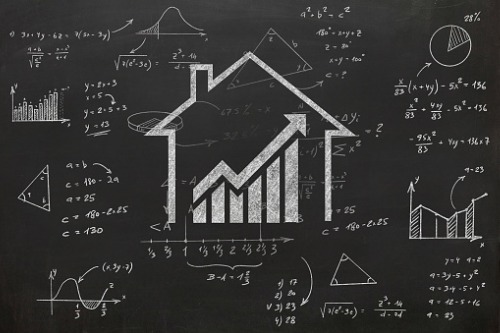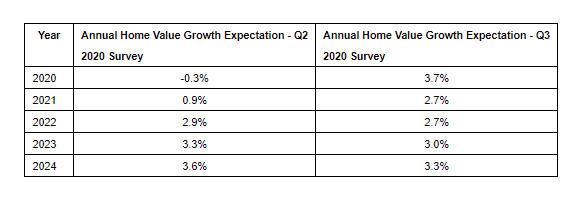Panelists are now more optimistic than they were even before the pandemic, new Zillow and Pulsenomics survey shows

There was a sharp turnaround in US home price expectations for 2020, but housing market experts anticipate economic headwinds to dampen long-term growth.
In a survey of 104 economists and real estate experts conducted by Pulsenomics and Zillow, panelists forecasted a 3.7% rise in home prices this year – up from the 3.3% expected increase in the first quarterly survey of 2020.
In Q2 2020 – when the housing market was in the midst of the coronavirus crisis – the panelists predicted a 0.3% drop in home prices for this year. So far, that expected decline has failed to materialize as supply shortage and surge in buyer demand have driven prices to soar, and panelists have adjusted expectations accordingly.
"In many ways, the pandemic has helped supercharge a pre-existing housing supply shortage that has struggled to keep up with strong demand," said Zillow Economist Treh Manhertz. "Many of those fortunate enough to have kept their jobs are looking to take advantage of low mortgage rates by jumping into the market, and they're finding competition to be fierce with inventory as limited as ever.
Strong home prices were predicted to continue through 2021, up from the 0.9% forecasted growth in the previous quarter to 2.7% – the most optimistic the panel has been about 2021 home price growth than they've been in more than three years.
"In contrast to the debate concerning the contours and sustainability of the US economic recovery, these survey data reveal a definitive and remarkably sharp V-shape in US home price expectations," said Terry Loebs, founder of Pulsenomics.
Due to the apparent turnaround, the majority of the panel has agreed that home prices will increase in 2020, with only two of the 104 respondents anticipating a nationwide price fall. Last quarter, 48 of 106 respondents forecasted a decline.

Zillow explained that experts with lingering concerns about the sustainability of home value growth were "focused on the labor market, where a consensus is forming that employment will take years to recover to pre-pandemic levels."
On average, panelists indicated a 44% probability that the US will go back to the 3.5% pre-pandemic unemployment rate by the end of the decade. Even those who have a more positive view typically think elevated unemployment will take until at least mid-decade to recover, with 71% saying 2025 or later is the soonest that the record-low rate from February will be revisited.
"The longer-term path for prices will depend largely on the course of inventory, including whether homeowner finances are stable enough to avoid a wave of distressed sales when forbearance terms expire and at what level builders, who are reporting sky-high confidence, can bring homes to market," Manhertz said.
"In a matter of a few months, the pandemic has turbo-charged what had been relatively limited acceptance of remote work, amplified the value of larger living spaces, and ushered in a new era of monetary accommodation by the Fed," Loebs said. "With these fundamental forces stoking demand for homeownership amidst stubborn supply constraints, it's hard to imagine home price expectations returning to the lows of last quarter any time soon."



